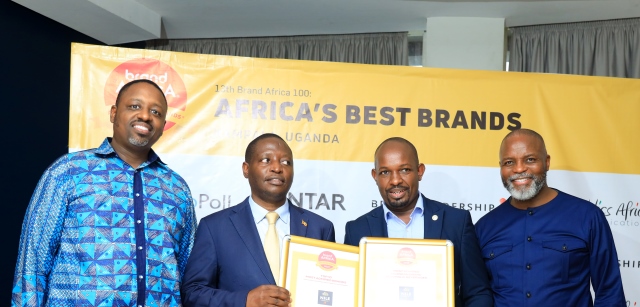Nile Special is Uganda’s most admired brew

Uganda’s Nile Special has been recognized as the most admired Ugandan brand in the alcoholic beverages’ category in Africa, as well as one of the top 10 brands doing good for people, society, and the environment in the country. The accolades were announced during the 13th edition of the Brand Africa Awards held at Golden Tulip Canaan Hotel, Kampala this week.
The Brand Africa Awards aim at recognizing and awarding the most admired brands across the African continent. The awards are based on a survey and rankings conducted by Geopoll, Kantar and Brand Leadership in Uganda, as part of the pan-Africa research across 32 African countries in the continent.
“This recognition is to the team that ensures Nile Special has that consistently refreshing taste over the years, the team in the trade that ensures a Nile Special is within reach for our consumers and the Ugandan farmers growing quality ingredients for our beer as well as the consumers who consistently choose Nile Special,” said Emmanuel Njuki, the Head of Legal and Corporate Affairs at Nile Breweries Limited (NBL) as he accepted the award.
Nile Breweries uses homegrown barley, sorghum, maize and cassava to brew its beers. Currently, the brewer has contracted 25,000 farmers (15,000 for barley and 10,000 for sorghum) in Northern, Eastern and South-Western Uganda, from whom it purchases produce worth UGX 109.3 billion a year.
“This recognition is a testament to the effort from our farmers in growing high-quality local ingredients,” Njuki added saying, “100pc of our raw material is locally produced. Our intention is to support local farmers in Uganda by creating a ready market for their produce. Our agriculture sustainability goal is to have 100pc of our direct farmers skilled, connected and financially empowered by 2025.”
Joseph Kanyamunyu the Managing Director Publics Africa, said the awards are aimed at “stirring brand consciousness among company owners, and a constant reminder to them to always improve their products and services because consumers are now their watchdogs.”

 African Heads of state head to South Korea next week for Summit talks
African Heads of state head to South Korea next week for Summit talks
 Trading leads as main source of income for Ugandans
Trading leads as main source of income for Ugandans
 New leadership for bankers’ umbrella as total assets top $12 billion
New leadership for bankers’ umbrella as total assets top $12 billion
 Brussels Airlines to announce Nairobi service
Brussels Airlines to announce Nairobi service
 SITA promises enhanced travel experience after Materna acquisition
SITA promises enhanced travel experience after Materna acquisition
 Saudia’s 105 aircraft order stretches A320neo lead over rival Max
Saudia’s 105 aircraft order stretches A320neo lead over rival Max
